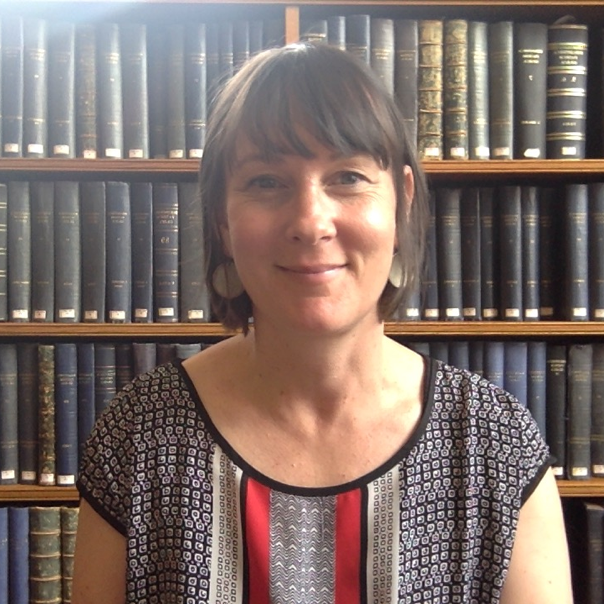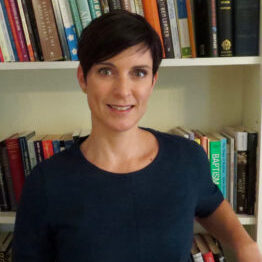Episode Transcript
[00:00:04] Speaker A: You're listening to by the well, electionary based podcast preachers recorded on the land of the Warunduri people.
[00:00:17] Speaker B: Hi, everyone. I'm Kylie Krab.
[00:00:19] Speaker A: And I'm Robin Whitaker.
[00:00:21] Speaker B: And today we're talking to you about the readings for lent two. We're going to talk about Genesis 17, verses one to seven and 15 to 16. Romans four, verses 13 to 25, and mark eight, verses 31 to 38. So let's kick off with Genesis then. Robin, can you give us a bit of context or something about Genesis 17?
[00:00:45] Speaker A: Yes. So this is the third time there's an attempt to make a covenant, or the promise of a covenant with Abraham as he becomes known. The first was back in Genesis twelve, where Abraham is told he will be a blessing, he will have multiple children, he'll be given land. There's then a whole narrative of him and Sarah, or Sarah, she's known at that point, being off in Egypt. And then in chapter 15, we get that promise repeated, particularly the promise around land and having multiple offspring. And then in the intervening chapters, Hagar, the egyptian slave girl, has been offered to Abraham. So Sarah and Abraham have had a bit of a panic that childbirth is not happening for them.
And we just need to name up front, this is a culture. It's deeply problematic. Hagar is an enslaved woman. She would have had no agency over her body. She basically is forced to be with Abraham and have his child. And that's where we arrive in chapter 17 with Abraham being 99 years old. He's got this son, Ishmael, with Hagar, and God appears to him again. So God just pops up in Genesis, appears. Hello.
And we get this beautiful name for God. We don't really know it's El Shaddai. The NRSV says, I am God almighty. But it's Shadai is language from mountain and shadow. So El Shaddai, and walk with me in my presence and be blameless, and I will give my covenant between you and I. Is the way this. So this is the third kind of giving of the covenant to Abraham.
[00:02:28] Speaker B: So should Abraham be believing at this time what's happening here?
[00:02:34] Speaker A: That's a good question.
I think there's some really interesting tensions in this reading. So the covenant, there's singular language. God is speaking directly to Abraham. It's a bit of a man to man, if we can use that language for God, one on one with you. And again, this promise of multiplying greatly. And Abraham basically sort of says, would like not get your favor.
So this is where the passage goes, just after the lectionary cuts it off and God's.
[00:03:07] Speaker B: We skip a whole bit here.
[00:03:08] Speaker A: We skip through.
[00:03:10] Speaker B: There's all sorts of interesting bits in here.
[00:03:12] Speaker A: Yeah. So if you're going to preach on this, you want to read at least this whole chapter, because the lectionary skips some stuff, and where it goes next is actually bringing Sarah back in. So I think we can interpret what's going on with the gender stuff in a few ways. I've heard some scholars talk, know the covenant's made with Abraham, and it seems like Sarah's or whoever, whatever woman bears the child is almost irrelevant, and yet it keeps coming back until Sarah herself has the baby. So this covenant is also with Sarah. And at the end, she's actually called.
She will be the nations, the mother of the kings of the nations. So Sarah is given a huge prominence in the tradition and also in this chapter. Right.
[00:03:56] Speaker B: She receives, actually, part of the blessing with the new name.
[00:04:00] Speaker A: That's right. So in the verses 15 and 16 that the lectionary does include, Sarah is named. She gets a new name as well. So Sarah, Sarah, Abram, Abraham, and this promise that she will have a son, that he will be blessed and she herself will become the nations, the king of the peoples will issue from her. Is the language a kind of literal translation of the Hebrew. And Abraham laughs. So this is this famous passage where Abraham laughs because it's so ridiculous that they're 99 years old and God is.
[00:04:35] Speaker B: Yeah.
[00:04:37] Speaker A: The other tension, if I. Yeah, exactly. The other tension in the passage is, I think, a really interesting one in that this is kind of one of the jewish covenants. Abraham is. We're going to see in the Romans reading next this father of the faith in the hebrew tradition, and yet there's this repeated reference to the nations, the Goyim, at least four times just in the passage we have. So this is an everlasting covenant, so that you will be a father of the nations. You will have a multitude of nations. She will be the nations. So this is a promise of land. And we recognize there's a difficult history that relates to current day politics, but in the midst of a very particular covenant is also this breadth that this is always for the world.
And again, we're going to see that language picked up in the way Paul talks about.
[00:05:31] Speaker B: Yeah, yeah.
[00:05:31] Speaker A: What strikes you in this reading, Kylie?
[00:05:33] Speaker B: Any. Well, I mean, I actually think that that stuff, that balance between the particular. This relationship with this particular couple, and I love how you're drawing that out, that it is a couple and it's not the abrahamic covenant is actually not just with Abraham or Abram and then Abraham, but how we balance this kind of particular and universal in all of these. I mean, there's attention across so many of our texts, right.
That there is a particular kind of gift to a particular people. But it is always meant to be something that benefits the whole world.
That feels to me like something that is an invitation and a challenge in how we engage with this text when we're preaching on it, as you say, particularly challenging at the moment. All these readings that we're getting about things to do with the so called gift, the theft of land, the entry into land to the promise of land that's being inhabited by others, how we deal with that in a place where there is obviously terrible conflict in the Middle east, but it's also really very present to us as settler people in Australia and how we're going to deal with those. That is, of course, people part of the verses that the lectionary cuts out. I know, but I think there's an invitation to look back at that and think, well, a. Why is the lectionary cutting it out? I know people don't want to sit through whole chapters, read out in worship, and maybe that's why. But why did they pick those verses?
[00:07:12] Speaker A: Yeah. And maybe because it is tricky. So the verse eight know, I'll give you the whole land of Canaan. The fact that the land has a name means it's also inhabited by peoples, right? So if you do preach on this text, I guess my plea is I wanted to name some tensions because we need to preach on these texts with nuance to go to one extreme or the other. Like, well, God said this land was theirs, so basically, bad luck to whoever was on it, right? And we know there's a legacy of that in the way that colonial christian people behaved, but also to hold with that this was always for a wider group of people. So any kind of sense of doing harm to people in the name of fulfilling the promise would seem to be at ods with the very heart of the promise.
[00:07:57] Speaker B: Yeah. And I reckon thinking about that as people of faith in congregations, the other part of the invitation is to think, how does our important particular relationship with God benefit the world?
It is the way into everybody. So they're both a part of what's going on here. And as we think through Lent, we're maybe taking on some extra disciplines or giving up some things in order to make space for faith and increased prayer and connection with God.
How is that personal discipline and building our relationship, both a gift to us and for beyond us.
[00:08:41] Speaker A: Yeah, I love that because I think if I was doing a cheeky sermon title for this passage, it would be something like, faith is not just about you. Right.
If your faith in all your beautiful disciplines is entirely.
You know, you haven't quite got to the depth of faith yet. The other sermon, I think, and I'm very conscious, at least here in Australia, we have a number of churches that are aging, and the average age of the uniting church, which is our denomination, is getting older. These are 299 year olds, and they inherit the promise of God from which all this life springs.
[00:09:16] Speaker B: Yeah, maybe new pregnancies are not what everybody.
[00:09:20] Speaker A: Not necessarily saying, go forth and get pregnant because be a medical miracle, but might be tiring. But there's a word of hope in there that. And this is a consistent theme in the bible, new life can spring from the most surprising of places. And just because you have an aging congregation does not mean you can't be carriers and fulfillers of this promise. Yeah.
[00:09:41] Speaker B: Yes, absolutely. And thinking about it, I know we're kind of joking about the thing about the 19, nine year old and the fertility that comes from it and stuff, but also, I guess, being conscious within that, how we use that as a very powerful and helpful metaphor, and also how we think about people who maybe are experiencing the impossible longing for a child and fertility. And this is really explicit in these texts, all these women who are unable.
Sarah begins a tradition that is going to go on with all of these.
[00:10:12] Speaker A: Matriarchs of women who can't have children.
[00:10:15] Speaker B: So thinking in those terms about both, maybe being careful how we talk about that in sort of literal sense, so people are not feeling that the scripture that could be a great gift to them is actually a real burden in their own suffering. Being told, if you have more faith or something, this would.
[00:10:36] Speaker A: Yeah, that's right.
[00:10:37] Speaker B: Maybe not. But then thinking beyond this about what is the kind of new life that we're talking about here amongst aged congregations, amongst all the human limitation that we live with, where is this new stuff that is springing to life?
[00:10:53] Speaker A: Definitely.
[00:10:53] Speaker B: Good.
[00:10:54] Speaker A: Well, let's go to romans four and see what Paul does with a bit of this tradition.
[00:10:58] Speaker B: Absolutely.
Okay, so romans four.
[00:11:07] Speaker A: Where do we start, Kylie?
[00:11:09] Speaker B: Well, I mean, there's a lot of interesting things in here as well. It obviously relates to the Genesis 17 reading, so it's worth. You can look at a bit of interplay there without thinking that they immediately follow on. It's what we might talk about as a reception we've heard about that before, biblical reception, where you're talking about how somebody later on is reading a biblical text. And here we have this amazing thing where we have someone who is also writing a text that becomes part of the Bible, reflecting on another part of the Bible and giving new stuff.
[00:11:42] Speaker A: Yeah, we're getting a form of biblical interpretation in action. And Paul, I mean, unfortunately, he doesn't really mention Sarah. He will do that in other places. He needed to do Bible study with you, Robert. He needed to hear that earlier interpretation. I could have given Paul some pointers, but I do like that he captures the global reach of, like, the promise that he would inherit the world did not come to Abraham or his descendants through the law, but anyway, inherit the world. So the greek word there is cosmos. So it's not that he would inherit the land of Israel, that he would inherit the world. We're immediately in some bigger, global cosmic framing for Paul.
[00:12:22] Speaker B: Cosmic framing, not so much. Are you talking about that this is like a part of a global colonialism kind of project or.
[00:12:31] Speaker A: Well, Paul's always apocalyptic. Right, exactly.
[00:12:35] Speaker B: So he's talking about something else there.
[00:12:38] Speaker A: Right?
[00:12:38] Speaker B: It's not a political program.
[00:12:39] Speaker A: That is that. Actually, no, this isn't. Yes, good point.
Just in case anyone interpreted me saying, go forth and colonize the planet, that is not what I'm saying.
[00:12:49] Speaker B: What we're taking away from this, I think also one of the things I find really interesting about this is it begins, as so often in Paul, you get this really tricky stuff about law and law being ineffective, contrasting things like law and faith and whatnot, that are maybe not as much of a contrast as we might think. And in fact, they end up not being really a contrast, not being opposites in Paul either. So he's using all these things in different ways. And these are the kind of red letter kind of passages that get used then for sort of anti jewish kind of sentiment in antiquity.
[00:13:31] Speaker A: Faith not works kind of that then.
[00:13:34] Speaker B: Become anti semitic in more recent times. And one of the things I find before we get stuck in this kind of, or like, supersessionist ideas, ideas like the old has gone, and this is the new. And that means. So we're getting rid of the hebrew scriptures and all of the wonderful things they give us and just going with that's all being overwritten. But, of course, this is introducing a story that uses Abraham as an exemplar of faith. So it's really not contrasting the know the Torah, the first five books of the Bible, with faith, because Abraham himself is the pinnacle of.
[00:14:15] Speaker A: Exactly.
[00:14:16] Speaker B: Yeah.
[00:14:16] Speaker A: And he's going back into the tradition to do. Yeah. As you said, this is not some, like, oh, those rigid Jews and their law. No, this is Abraham.
And the language here is beautiful. It's language of promise and of hope. Right. And this is what faith.
[00:14:37] Speaker B: Like Paul is getting even more vivid in his description of dead things.
Abram's body, Abraham. Sorry. He says here, abraham's body is as good as dead. And we hear, we're talking about it as a dead thing.
It's a body that is not doing the things that bodies do when they're flourishing. Right.
But then this new thing is done. So the way in which he's.
What's the word? The kind of exemplar of our faith, the person who gives us a picture of what it means to be faithful, is the way that he believes, despite all this deadness around him, that new stuff can come forth.
[00:15:22] Speaker A: Yeah. And that in turn, then, if we follow Paul's argument here, will point to Jesus, who also was dead, and from him came new life. So these are kind of examples and metaphors Paul is using to make the point that this is what God does, this is how God behaves. God can bring new life from dead things. Even though poor Abraham was not actually dead, he was just old.
We've got a bit of hyperbole. He's making his point. He's very rhetorical, Paul.
[00:15:53] Speaker B: And maybe as we travel through Lent, one of our invitations is to think about, yes, there's this promise of the new thing that's going to come forth, but also there's a focus on the things that are dead. And so the faith and the new thing that will come is not because you can already see it or anything, it's a promise, despite current circumstances. So we're probably feeling pretty present through lent to the things that are really tough.
[00:16:25] Speaker A: Yeah.
And I think there's two sides of that. Some of it is sitting with where there's grief, right. Where there's repentance, where there's regret, where there's pain.
And one of my questions, which I think Lent always sharpens for me spiritually, although it should always be there, is also, what are the things that we can let die. Right. So that new life can come. Sometimes we've actually got to let go of something over there to step towards the new or the thing that's more life giving or say no to something, so that we can say yes to something else. So the sitting with the death can have multiple layers and will obviously be different, depending what's going on in people's lives during this season.
[00:17:08] Speaker B: Yeah, I love it. And it's a great segue to our next reading where we're going to talk about things that we take up as part of this. So, turning shortly to mark chapter eight.
[00:17:22] Speaker A: If you'd like to know more about by the well or any of our hosts, please visit buythewell.com au.
So, Kylie, we're in mark chapter eight, verses 31 to 38. We've leapt ahead. Last week we were in Mark chapter one and now it's like, what?
Where are we in the gospel at this point?
[00:17:46] Speaker B: Yeah, great. I mean, this is always a great question, but for today it's the crucial question. Well, it's a crucial question because this is widely known as a kind of turning point in the gospel. It's really an important moment.
So we've had the introductory stuff in Mark.
We've had the stuff where we've been building up.
Jesus's identity is being built up. We're learning through his miracles, through various bits of teaching, all sorts of things that he is outstanding and amazing. So then we get to Mark chapter eight and we've had this conversation just before this where Jesus has been.
Oh, I think we've had this bit before this where Jesus has been asking who do people say that I am? And all that. Yes, there we looking. I'm not reading the memory two verses before.
[00:18:42] Speaker A: Yes, you're right.
[00:18:43] Speaker B: Just before my computer wasn't open to the right bit. Very good. So we've had this bit just before. Who do you say that I am? And we have this thing. So we have this statement of faith about you are the messiah. So this is great. Something has been picked up and then all of a sudden everything changes.
You'd have a complete change of lighting on the set or something. And we turn to this passion prediction. It's the first time that Jesus says what's going to happen, that he is going to undergo great suffering, be rejected by the elders, the chief priests and the scribes and be killed, and after three days rise again and it causes conflict. So from here on in, after this turning point, we're going to have this thing, you know how the disciples in Mark get kind of characterized as being not getting it.
This is going to carry through this next bit that goes all the way, really up to the final week of Jesus'life, as we tell it just before the crucifixion, where more and more we're learning about the hard stuff that is going to happen. And it's basically a way of saying, so you've seen all of the stuff about what kind of messiah. You've seen this battle with the powers and stuff that we get in the healing, the healing, all that stuff. And now Jesus is putting a bit more flesh on the bones of like. But this is the kind of messiah that I am.
[00:20:08] Speaker A: Yeah. I do feel like this is a bit of a stark turn for the disciples because, I mean, at this point they've gotten to see Jesus do some very cool things like feeding the 5000 and walking on water and healing people and the crowds flocking to him. And then all of a sudden he's talking about suffering and rejection and death. But I have another question for you, Kylie. So this passage starts with he began to teach them that the son of man must the little word in greek day. And I remember being taught that this is a divine necessity. Know, God needs, you know, so what do we do with that very tiny but quite important word? He must suffer.
[00:20:45] Speaker B: Yeah.
Not interpreted as divine necessity would be my hot tip. So it is a word that means a whole range of different things as one thing will follow from another kind of thing. So in this context, there are all sorts of words that are used all the time to describe something like necessity. People talk very frequently and openly about things like fate and providence and all that kind of fortune, the power of fortune. In the wider context.
[00:21:19] Speaker A: You mean in the ancient context.
Typical language.
[00:21:23] Speaker B: Yeah, not in the New Testament.
And there is a stronger word for divine necessity, ananke. So that's a different word. But here we're using, like, the weakest form of this that you can have. This is not about divine necessity. This is about something. The way I would interpret it would be about something more like inevitability.
So sometimes you might use this word to describe that something that has been foretold by the prophets will inevitably happen. This will inevitably happen because it was foretold by the prophets. Of course it's going to happen. It's already known that this will happen.
But the other way of thinking about it is also this will inevitably happen because if you are living by gospel values, it will bring out this suffering and rejection. So Jesus has kind of foreseen this, but it doesn't mean God set the whole show up so that this is what would happen.
[00:22:20] Speaker A: And that's a subtle but really important theological distinction, right. Between God sent Jesus simply for the purpose of dying versus, yes, God sent Jesus and as a result of Jesus living this faithful life with God according to the values of God's kingdom, he is killed by the state.
[00:22:39] Speaker B: Yeah, those are subtle but quite different and important statements. And so that will be important for our christology when we're thinking about some of these things. It's also important, I think, for the way we think about suffering and God's role in suffering in our own lives as well.
Not that God is creating suffering or creating these kinds of things, but sometimes living by the values of the kingdom will cause.
[00:23:12] Speaker A: Will have consequences, will have consequences. And some of those won't be you get really rich and have a cushy life.
[00:23:17] Speaker B: Yeah, that's right. And other suffering, contrary to what some people preach. Yeah, that's right. And other forms of suffering maybe come from totally outside that world. And then there is a conversation about how God responds when we experience suffering rather than God sending suffering. So I think that's important. But I've said a lot about that. And what I really want to ask you, Robin, is Robin has actually written an article about this passage, and so she knows all manner of additional things about it. And I would like to hear from you, Robin, what you think are the important things we need to know.
[00:23:46] Speaker A: Well, my kind of theory, and it's really not that hard to see, is I think this is all about discipleship. Right.
And we get some key language that helps us see that. So as part of setting up, picking up where you, you know, Peter's response, and Peter's often the spokesperson for the group in Mark. So Paul Peter cops it, but he's often kind of just saying what the disciples think. Peter's response to this teaching about suffering and death is to rebuke Jesus like he cannot handle this is not good news for him. We'll maybe return to what is the good news? Passage, and then Jesus rebukes him back. So we get some rebuking going on. Get behind me, Satan. One of the interesting things that I think is a bit lost in the translation in English is the get behind me, Satan. We can talk about Satan in a minute. The get behind me is the same language we get for the call of the disciples in chapter one. And we will get it again at the end of mark where the sort of angelic young man at the tomb says, go tell Peter and the disciples to go before me to Galilee. So this language is episomu, literally behind me, after me. So it's discipleship language.
[00:25:01] Speaker B: Follow language.
[00:25:02] Speaker A: Follow language. Yeah. And then, of course, in what follows from verse 34, we get more explicit teaching by Jesus now to both the disciples and the crowd. So it's expanded, if any, want to become my followers. So different language there, but also following language. So there's a whole lot of stuff here about if you're going to follow Jesus. And for some reason, this following language always makes me imagine, like, a mother duck with all the little ducklings lined up, and it's like Peter got out of line and stood in front of the mother duck and tried to rebuke it. And Jesus is like, this is kind of a get back in line because you've got to learn what it means to follow me, and you haven't quite got it right yet.
So I do think it's a kind of a call. The Satan's pretty harsh.
[00:25:44] Speaker B: Yeah. You promised we could talk about it.
[00:25:45] Speaker A: Okay.
So I would see Satan less as, like, don't imagine a little devil here.
Satan, in the jewish tradition, he increasingly becomes, like, a personification of evil.
And that change is happening around this time. But in the Hebrew Bible, Satan is a kind of adversary tester. So I think by calling Peter Satan, it is harsh.
We can't pretty it up. But it is like saying, kylie, get back in line. You're tempting me, kind of.
Don't. Don't tempt me with.
Yeah, so it's in that ilk. So we should really talk about discipleship then, because then we get this really hard teaching about denying themselves and taking up a cross.
Luke will soften this with take up your cross daily, mate.
[00:26:37] Speaker B: Is that softening or harder? You have to do it every day. Well, it's like a kind of constant practice.
[00:26:42] Speaker A: Well, I feel like then it's at least not literal because you can't die every day. Oh, I see. Whereas take up your cross. I think in Mark might literally mean.
[00:26:51] Speaker B: Get ready to die.
[00:26:51] Speaker A: I mean, he talks about, you need to be prepared to lose your life for the sake of the gospel. I think martyrdom is a very real threat in this community.
[00:26:58] Speaker B: And Luke thinks just to defend Luke.
Luke seems to think, be ready to die every day. It might come upon you.
[00:27:04] Speaker A: Well, maybe. Yeah. Okay.
[00:27:06] Speaker B: All right.
[00:27:06] Speaker A: We can concede that point.
[00:27:08] Speaker B: He's just making some things from Mark more explicit. Maybe it's already there in Mark.
[00:27:12] Speaker A: Right, listeners? Just reading between the lines. I really like the gospel of Mark. Kylie really likes the gospel of Luke.
One of us is correct.
[00:27:20] Speaker B: Just spend more time reading Luke.
[00:27:22] Speaker A: That's good.
I think we should comment this deny themselves language.
[00:27:26] Speaker B: Right.
[00:27:26] Speaker A: Because it has a difficult res. Like deny themselves for the sake of the gospel has been said in terrible ways to women and other people about put up with anything, including abuse for the sake of the gospel. Your husband will be converted by your patience and good faith kind of stuff. And I don't think this is dreadful. It's awful.
So we need to be careful. Again, we were saying, be careful with the genesis reading. Just be careful this week.
Be careful. When we start talking about deny ourselves, we're not talking about some self flagellation or leaving people in situations of abuse and with no agency.
A self denial actually comes from strength and power. Right. So we're not talking about the subjugation that others are doing to you. Right?
[00:28:19] Speaker B: No, that's right. Actually, it's an interesting kind of conundrum about preaching in general or worship on anything. To think about where both these things are true, like about taking the call to self denial and also to not cause the denial of. Denial of personhood of another or something like this. Sometimes.
How do we make sure that people hear the bit they need to hear in how we're speaking?
[00:28:48] Speaker A: Because a lot of us who are.
[00:28:49] Speaker B: Powerful, who come from certain positions, really do need to hear in settler society, like we were saying before, in the majority world.
No, not that.
In the part of the world where we come with strength and whatnot. In the west, maybe we do need to hear about denial and to take.
[00:29:13] Speaker A: It seriously and to some self sacrifice so that others can flourish.
[00:29:17] Speaker B: Yeah, that's right.
But making sure that the hearing, that challenge is not simply heard by the people who need to hear something different.
[00:29:27] Speaker A: Yes.
How we preach the good news in the midst of a really hard passage, that's actually saying be prepared to suffer and die for your faith.
It's not saying suffering and dying for your faith is always right, the reality. And it's not saying if you're suffering, that's what Jesus wants you to do. We need to be really careful in the way we talk about these things.
What would you preach?
I'm thinking if I was going to preach the mark text this week, I think I'd want to ask a question like, what kind of Jesus are you following? Because who we think Jesus is determines the kind of disciples we are. And this challenges. As much as I'd love to follow Jesus who's the constant healer, or Jesus who has the power to change the world, this is also the Jesus who's prepared to suffer and empty himself of his power. So what does that say to me as a follower of that kind of messiah? So I think that would be my question of this text. What about you?
[00:30:30] Speaker B: I'm leaning towards stuff about where is their death. And where can we believe there can be new hope? It might be in our lives. It might be structural death. It might be structures that really are oppressing people. Where is their new possibility?
[00:30:48] Speaker A: Lovely. Great.
[00:30:49] Speaker B: Thanks for talking, Rob.
[00:30:54] Speaker A: By the well is brought to you by Pilgrim Theological College and the uniting Church in Australia. It's produced by Adrian Jackson. Thanks for listening.





